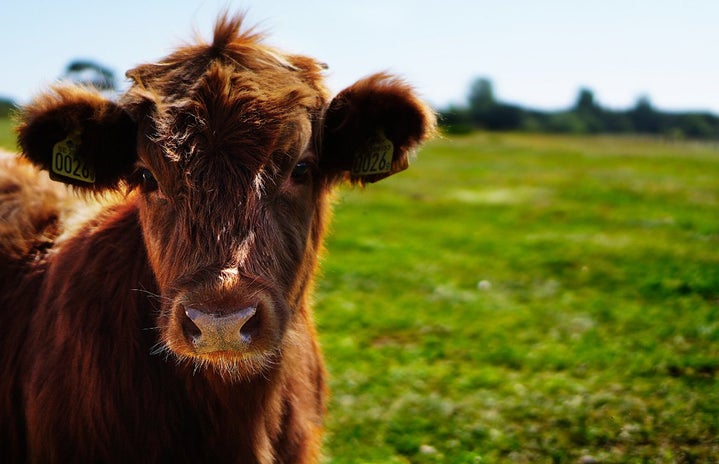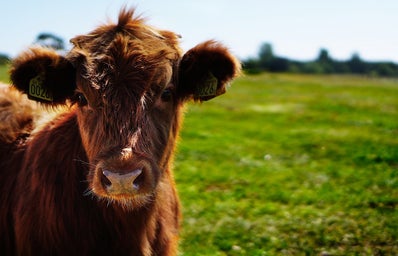- Veganism is For Hippies
-
Believe it or not, being a hippie, being overly particular about your health, and obsessing over your environmental footprint has next to nothing to do with veganism. People tend to conflate veganism with a lot of different things. I find myself often in conversations with people, where they make assumptions about certain beliefs or concerns they project onto me, such as being someone who seeks out organic or healthy food. This misconception can probably be traced back to people’s perception of vegan food; after all, fruits and vegetables are probably what those with little exposure to veganism picture when hearing the word “vegan,” as well as lack of exposure to vegan junk food. However, it is important to understand that there is a distinction between eating plant based and being vegan. One can eat a plant based diet and still not be vegan. This is because veganism is a belief system that is primarily concerned with animal ethics, not health, the environment, or being “natural.” This is not to say that these are not all things that many vegans care about greatly, just that there is a fundamental misconception that because there is overlap on these issues, that there is some sort of inherent ideological underpinning within veganism that prescribes its adherents to shop fully organic at Whole Foods and become obsessed with Greta Thunberg. Since we’ve established what veganism isn’t, let’s discuss what it is. Veganism is a philosophy and way of living which seeks to exclude—as far as is possible and practicable—all forms of exploitation of, and cruelty to, animals for food, clothing or any other purpose; and by extension, promotes the development and use of animal-free alternatives for the benefit of animals, humans and the environment. In dietary terms it denotes the practice of dispensing with all products derived wholly or partly from animals (The Vegan Society, n.d.a) Furthermore, while a whole foods plant based diet is one of the healthiest diets a person can adhere to, many vegans are not concerned with the health benefits that come along with eating a plant based diet. Being preoccupied with health would be especially counterproductive when it comes to promoting veganism to nonvegans and attempting to make it more mainstream. You don’t win over many omnivores with salad, but oreos on the other hand..
- Buying Dairy Products Doesn’t Result in the Slaughter of Cows
-
Likely the most contentious debate between vegans and omnivores tends to concern the consumption of dairy products. Vegans boycott it and most of the rest of the population doesn’t understand why. It’s even commonly brought up as a talking point to mock vegans for being overly sentimental and irrational. The reality is, the dairy industry is the meat industry. Even if one were to erase the horrors that dairy cows face, whether in factory farms or on local, free range farms, once they cease to produce milk, they are shipped off to the meat industry to be slaughtered for beef production. Let’s analyze the life of a dairy cow a little closer: in order for a cow to produce milk, they must be pregnant. Cows are repeatedly forcibly artificially inseminated or for a less politically correct term, raped until they become “spent” dairy cows who can no longer produce milk and therefore money (Palmer, 2011). Cows have a strong maternal instinct; they bond very intensely with their babies soon after birth, but the dairy industry isn’t in the business of mental and physical wellness, they’re in the business of making money. After the mother cow’s milk is stolen from her, within 36 hours, her baby will be stolen too. This separation is traumatic for the mother cow, who often will wail out for her baby to be brought back to her, which will go on for days. The baby cows’ fates will be determined by their gender; female cows will be destined to be brought up as milk machines, just as their mom, while males will be slaughtered right away for veal (Newkey-Burden, 2017). This is without even taking into account the actual conditions the cows are kept in, which are dismal to say the least, on factory farms. While upwards of 99% of all animal products are sourced from factory farms, it is important to make clear that no matter how great a farm’s PR team is at promoting their farm as being “local, grass-fed, free range, and humane” all dairy cows undergo this psychologically damaging process of being repeatedly raped, forcibly impregnated, have their babies stolen from them, and will eventually be killed for meat (as will their calves).
- Veganism is Inaccessible & Hard
-
While I won’t tell anyone how they should feel about making a significant lifestyle change that involves giving up foods you’re used to and grew to love, I will say that potatoes, rice, beans, tofu, fruit, and vegetables are certainly not inaccessible. In fact, they’re some of the cheapest foods on the planet, which are easily accessible in all grocery stores. Certainly no one reading this article can use inaccessibility as an excuse to not go vegan. This is not to say that it will be the easiest thing you ever do on day one or that feeling like it’s a struggle is invalid. It is just factually not true that vegan foods are inaccessible, certainly not less accessible than meat and cheese, which some would argue are luxury food items. I do, however, need to walk back my first statement a bit, because in 2021, there is really no “giving up foods” to go vegan. There’s a vegan substitute for virtually any and every food or drink your mind can conjure. Mainstream fast food chains now proudly carry vegan options at a rate that shocks even me. Going vegan in 2004 was certainly harder than it is now. It would have required a little more hunting for specialized vegan mock meats and cheeses at the store and necessitated more cooking. However, these things are small inconveniences in comparison to the absolute horror and suffering that billions of animals endure every single year for completely arbitrary reasons. Choose compassion, it’s never been easier than it is right now.
- Veganism is Unhealthy and Leads to Nutritional Deficiencies
-
It is the position of the Academy of Nutrition and Dietetics that a vegan diet is suitable for all stages of life, including during pregnancy and infancy, as well as provide health benefits in the prevention and treatment of certain diseases. These include but are not limited to: lower blood cholesterol levels, lower risk of heart disease, lower blood pressure, lower risk of hypertension and type 2 diabetes, a lower BMI, and lower overall cancer rates (Craig et al., 2009). Vegans can not only be healthy, but thrive on a plant based diet. This study by John McDougall found that plants have a complete amino acid composition and that it is completely unnecessary to consume animal protein to meet these requirements. McDougall writes, “a vegetarian diet based on any single one or combination of these unprocessed starches (eg, rice, corn, potatoes, beans), with the addition of vegetables and fruits, supplies all the protein, amino acids, essential fats, minerals, and vitamins (with the exception of vitamin B12) necessary for excellent health” (McDougall, 2002). This is to say that all the effort it takes to meet your protein needs on a vegan diet is to eat an adequate amount of calories. While it is simple and easy for vegans to meet all their nutrient requirements, it is advised that they should supplement for vitamin B12, as should nonvegans. The only difference is that nonvegans can source vitamin B12 through their diet, while vegans will need to source it through a vitamin supplement. B12 is the only vitamin that is not recognised as being reliably supplied from a varied wholefood, plant-based diet with plenty of fruit and vegetables, together with exposure to sun (The Vegan Society, n.d.b). There are vegan foods which are fortified with vitamin B12, but to ensure that you are getting and absorbing adequate amounts of the vitamin which is crucial in maintaining overall health, as B12 deficiency is very serious, it is not advisable to forego a supplement.
- Vegans Would Not Eat an Animal if Stranded on an Island
-
Let me restate the definition of veganism for all who have trouble understanding. Veganism is a philosophy and way of living which seeks to exclude—as far as is possible and practicable—all forms of exploitation of, and cruelty to, animals for food, clothing or any other purpose; and by extension, promotes the development and use of animal-free alternatives for the benefit of animals, humans and the environment. In dietary terms it denotes the practice of dispensing with all products derived wholly or partly from animals (The Vegan Society, n.d.a) The “as far as is possible and practicable” aspect is an important component of veganism. People tend to think they’re quite clever when asking a vegan what they would do if they were left alone on a stranded island. These people don’t seem to realize that this survival scenario, in which one may have to hunt for food in order to survive, is not at all incompatible with veganism. It is also completely hypothetical. Believe it or not, vegans are not inherently fanatical people detached from reality. This same hypothetical question can be posed to any group of people and result in similar moral dilemmas. Let’s say there are no animals on this stranded island, there are only two people. While these two people may be morally averse to murder and would much prefer for both of them to be spared, one of them would likely end up killing the other in order to survive. It wouldn’t make someone who is against arbitrary murder in a civilzed society a hypocrite. Veganism is not pacifism.



